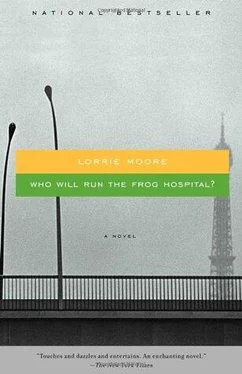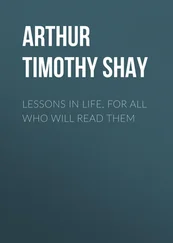“I’ll visit her,” I promised.
“Silsby called to find out when you were coming home. I didn’t tell her exactly.”
“You didn’t?”
“She’s not a good influence on you, Berie. She never has been.”
“What do you mean?”
“There’s too much strain in her family, the situation with her parents and all. I always felt you spent too much time over there. You should have other friends. Her family has enough to worry about.”
“There’s strain in every family. Besides, they’re not worried about me . I’m not getting in the way.”
“I’d prefer it if you didn’t see her too much right away. Take a break from the friendship.”
“I’ve had a break.”
“Silsby and I spoke for a little bit, and I told her the same thing.”
“You did what ?”
“She said she wasn’t going to be around for a week anyway. She was going camping with her boyfriend, Mike, so she wanted me to tell you that and to wish you all the best at school, since it looked like she wouldn’t be able to see you.”
“Wouldn’t be able to see me?” Something stung and ached before my eyes: a picture of Sils, peeling along the lake roads on the back of the new bike Mike would surely by now have bought with the insurance money. “The crowd goes crazy!” he would shout and laugh, whipping dangerously around the curves. They’d go to the State Park campground, and in a blue pup tent lie listening to “Brandy, You’re a Fine Girl” on Mike’s transistor, slapping the beat on Mike’s thighs. I felt bludgeoned and bleak and abandoned. “Mom, why did you have to say all that?” I bleated mournfully. “You didn’t have to say all that!”
“Berie,” she said, trying to sound gentle, “you needn’t make a tragic caricature of every small emotion.” And then we said nothing else, staring straight ahead at the road, or off to the side, where miles of trees had burned in a recent fire — stanch and starch the mush! — and where now toadstools were sprouting through the charred ground.
Back in Horsehearts I went over by myself, on my bicycle, to visit my Grandmother Carr. I had phoned beforehand, and she had suggested the time: two-fifteen.
The weather was cool for August, but I was warm from my bike ride. I climbed wearily up the stairs of her front porch. The door was open, and so I called through the screen. She appeared, wearing a light summer suit, her gray hair curled up in back in a twist. She showed me into her book-lined sitting room, where I had two davenports and a chesterfield to choose from. All her furniture was shadowy and hulking, like an indentured household staff. I chose the chesterfield. She brought me a cup of tea. Then she sat down across from me and sipped from her own cup. I looked down at the floor, pretending to study the busy patterns of the Persian rug. I had seldom visited her — I could have counted the times on one hand: the time when I was five and had stood in her kitchen and asked, “Grandma Carr, who is older, you or Daddy?” And she had scowled. Idiot child! Or the time when I was seven, and Claude and I brought her a gift — an old jack-in-the-box we didn’t want anymore. Or the time when I was ten and brought Sils along, and we sat at the dining table and asked for cookies. My grandmother had fetched us some graham crackers, a little mechanically. “Can we have some juice, too?” I’d asked, and after we departed, full of snacks, she phoned my mother to tell her of our rudeness and demands. When I got home, as punishment, my mother took out all the guest towels and made me iron them.
“Your father tells me you’ve been in some trouble,” my grandmother said now.
I was silent. “A little,” I said finally.
“And now they want me to send you to the Mount Brookfield School.”
“Yes,” I said. I’d forgotten my grandmother would be footing the bill. “I guess.”
She looked at me in a vaguely interested way. “Did you enjoy camp?”
“Pretty much,” I said.
“Did you?” She looked amused.
“It was interesting to meet all kinds of people from all over the state,” I said, like a walking, talking application essay.
She nodded. “We sent your father to camp once,” she said. “He was only five years old. At the time he was a little chatterbox, very cute but a chatterbox, and your grandfather and I wanted a vacation alone in Europe.” She pursed her mouth and sipped some more tea; I waited to hear a slurp but there wasn’t one. “We sent your father to a German summer camp in New Hampshire called Kinder Koop. When he came back, he was stone quiet.” She stopped for effect. “He’d become, as he would remain for the rest of his life, a shy person.”
The wordless moment now between us was long, low, sonorous as a cello note — a mix of catgut and wood, of animal and plant. “Of course, it was a mistake,” she said finally. “It was a terrible, lonely thing we did to such a tiny boy.”
Pity pooled in my throat. Dad! I drank more tea. I swallowed and coughed.
She now rose from her seat, in a change of subject, and walked dramatically around the room, as if she were in a play. My eyes followed her, and in so doing, I realized that she had no pictures of us — her children or her grandchildren — anywhere in this room. Nor did she have any elsewhere in the house, that I knew of. “When I was at conservatory,” she said, “I’d gone there after much turmoil in my life. To go from turmoil to tranquillity is excellent for music. To go from an iniquitous den to a practice room is a respite given to us by God.” She stopped and stared at me. “It is to grow wings. I hope you will find something similar for yourself at the Mount Brookfield School.”
“I hope so, too,” I said. “I mean, I don’t see why not.”
“Well, my dear …” She was still standing; she had already put her teacup down. Now she looked at her watch. “I realize you have many things to do. But I wish you all the best.” I stood up, as I guessed I was supposed to, though I still had half a cup of tea. She shook my hand and kissed me on the cheek. Suddenly I loved her very much.
“Thank you,” I said. I threw my arms around her waist and hugged her tightly. I pressed my right cheek against the pale lapels of her suit and closed my eyes. “I hope I’ll have a musical moment like that, too,” I said awkwardly, and she made a light, humming sound like a laugh and patted me on the head.
At the Mount Brookfield School I wrote to everyone: to Hayden Filo, to Claude, to my parents. I wrote to my grandmother. “Hey, Grams,” I began one letter, but then crossed it out and wrote “Dear Grandmother Carr.” By the cross-out I drew an arrow and wrote “picture of me in a new hat.” She never wrote back.
But my parents did. They said they had given my room to a Japanese foreign student and weren’t sure whether there’d be room for me to come home either fall break or Thanksgiving, though Christmas was fine.
To Sils I wrote long descriptions of the “precious, pukey campus,” of all my difficult schoolwork, of the dining hall where dogs were allowed and there was unlimited ice cream (the eccentric demands of some benefactor). I described the native attire, the preppie Scottish sweaters I refused to buy, though once I almost hocked one in town but put it back.
I dressed in what I thought was glamorous — black and gold things. Sometimes a cape or a hat or a scarf that sparkled. I arranged my face and hair in a fever of private notions: a theater of one. I wasn’t looking around. I wasn’t costuming myself in any context that was real. If I pushed it too far, if it got too glittery or tacky, I’d say to people, “Hey, at Horsehearts High this is chic .” I’d send it all up as a joke, a put-on. But if it seemed to work, if people liked it, I would say, “Thank you,” in an earnest, whispered way. I became exotic among the preppies. I hung out with the wisecracking boys.
Читать дальше












